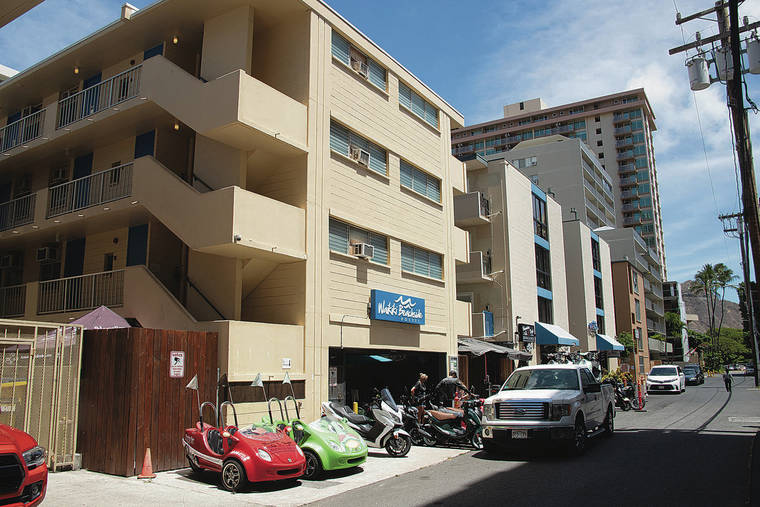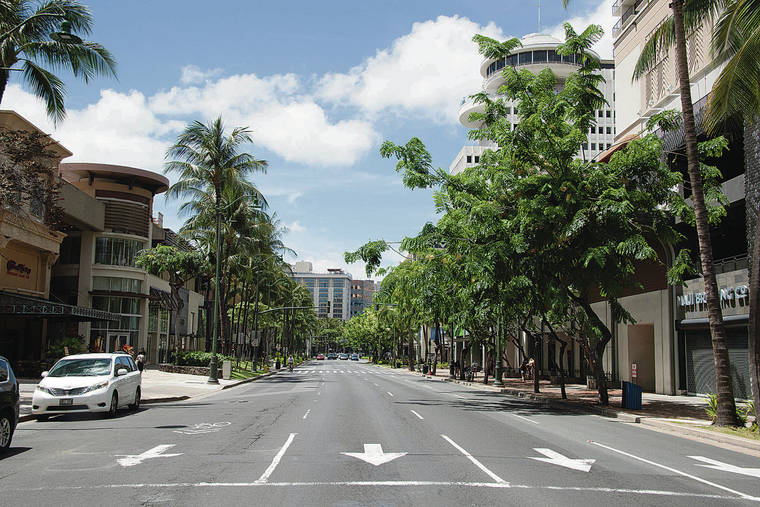Hawaii officials eye empty hotel rooms, hostel for quarantine space

CRAIG T. KOJIMA/CKOJIMA@STARADVERTISER.COM
The state Department of Health is using about 50 rooms at four Waikiki hotels for quarantine and isolation space. It is looking at turning the Waikiki Beachside Hostel, above, into a quarantine and isolation center.

CRAIG T. KOJIMA/CKOJIMA@STARADVERTISER.COM
A normally busy Kalakaua Avenue had no traffic on Friday.


As COVID-19 cases continue to surge on Oahu, officials are seeking more Waikiki hotel rooms to house those who need to quarantine or isolate, and are considering taking over an entire hostel for that purpose.
The state Department of Health already is using about 50 rooms at four Waikiki hotels for quarantine and isolation space for COVID-19 positive people and close contacts who have been exposed and may or may not be positive.
Edward Mersereau, DOH’s Behavioral Health Services Administration deputy director, briefed the Senate Special Committee on COVID-19 on Wednesday about plans to convert another 130 hotel rooms for this purpose over the weekend or early next week.
Officials also might use CARES Act funds to lease a Lemon Road hostel for use as a quarantine and isolation center, according to Sen. Sharon Moriwaki, who represents Waikiki and is on the Senate Special Committee on COVID-19.
Sources told the Star- Advertiser that the Waikiki Beachside Hostel at 2556 Lemon Road is under consideration. A hostel employee said Thursday that there had been discussions to tap the property for a COVID-19 response.
Alexander Zannes, communications director for Honolulu Mayor Kirk Caldwell, did not confirm the hostel project Friday. But he said in a statement,“The need for isolation and quarantine facilities is vital. We support whoever is working to secure quarantine housing, and we will have an announcement regarding the city’s efforts on Monday.”
Don't miss out on what's happening!
Stay in touch with breaking news, as it happens, conveniently in your email inbox. It's FREE!
Lt. Gov. Josh Green said establishing more quarantine and isolation facilities is a huge deal “especially for some of the populations that had a big burst of COVID like the Pacific Islander community.”
Green said there’s also a need for additional capacity for individuals who are COVID positive in long-term care facilities.
“We need this, and if we have the capacity to rent some hotels, I think we should do it,” he said. “The number of cases is large right now, and coming off this spike is going to take awhile. In a lot of these cases, if we want to stop the spread that is in households, it would be good if we had a few hotel rooms to quarantine people away from the positive cases.”
Inmates who have been released from the Oahu Community Correctional Center also may need space to quarantine or isolate, Mersereau said.
Connie Mitchell, Institute for Human Services executive director, said she’s glad state and city officials are working on expanding quarantine and isolation capacity, which is sorely needed, especially for vulnerable homeless individuals.
Mitchell said she’s not up to date on specific expansion plans, but previously has offered IHS medical support.
A city-owned building on Kaaahi Street has been turned into a quarantine and isolation facility. IHS’ Sumner Men’s Shelter, where there was a COVID-19 outbreak, also is temporarily serving as a quarantine and isolation spot. But Mitchell said they aren’t enough.
“We definitely need more space. We are seeing more homelessness as a result of the economy,” Mitchell said. “We are also seeing some people, who live in tight spaces or with medically vulnerable people, made temporarily homeless because they can’t quarantine or isolate in their own homes.”
Moriwaki said the Lemon Road facility is a good idea if officials satisfy her district that sick people will be kept in the facility until they are well and that homeless guests won’t add to the count of unsheltered people living in the district. She also said government should tap more empty hotel rooms as other cities and states have done across the nation. In July, thanks to COVID-19 fears and lockdowns, Hawaii’s hotel occupancy statewide wasn’t even at 21%.
“It seems to me if hostels and hotels are empty and they are going to be that way for a long time, using them to help stop the community spread of COVID-19 is a far better alternative than for them to go out of business or not be able to pay their mortgages,” Moriwaki said.
Kekoa McCllellan, Hawaii market representative for The American Hotel and Lodging Association, said a healthy list of Hawaii’s hotels are part of Hotels For Hope, which connects hoteliers with government entities interested in using properties to support communities through the crisis.
While government has leased entire hotels in some destinations, so far, McClellan said Hawaii officials have not articulated a need for that degree of quarantine and isolation capacity.
“Most of the requests have been to help house first responders that need to socially distance,” he said. “If there’s a greater need, there is capacity and interest at some Hawaii hotels to meet that need.”
Moriwaki said she’s hopeful government can work with Waikiki’s hospitality industry to expand quarantine and isolation space, but officials are “going to have to sell it to residents.”
Robert Finley, chairman of the Waikiki Neighborhood Board, expressed reservations regarding the Lemon Road project.
“I really can’t support it if they are bringing people into Waikiki that weren’t already in Waikiki,” he said. “I’m OK with it if it’s Waikiki homeless folks. They are here. They are already ours and we need to take care of our own backyard.”
Kathryn Henski, a Waikiki Neighborhood Board member who lives near the hostel, said she won’t support it unless she’s guaranteed “that individuals can’t get out of the center and the city commits to cleaning up this neighborhood first.” We already have serious issues with homelessness,” she added.
During Wednesday’s briefing, Moriwaki asked Mersereau to address safety and protocols for the quarantine and isolation center.
“It’s kind of like the Hotel California — once you check in you can’t really check out until you get medically cleared,” he said. “We have them sign a waiver that they agree to stay there for the amount of time that they need to stay there.”
Mersereau said acute care cases are handled similarly, but would have “more medical case management support on-site.”
If occupants don’t stay where they should, Mersereau said, DOH has enforcement powers.
So far “we’ve had 94% to 97% adherence from any of the folks that we’ve asked to isolate or quarantine, and that includes Sumner IHS,” he said.



